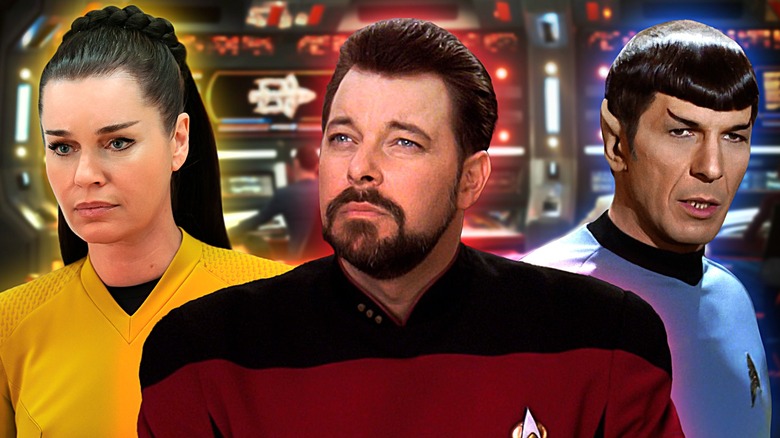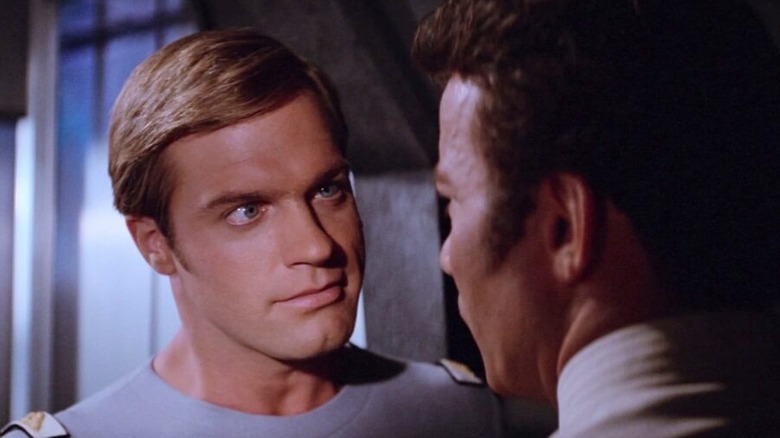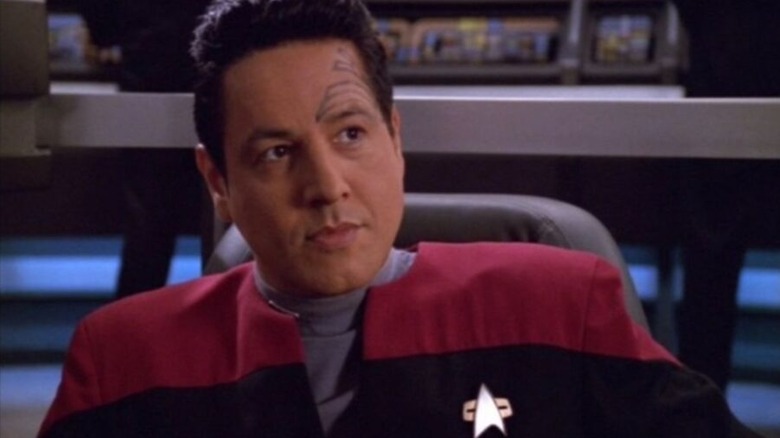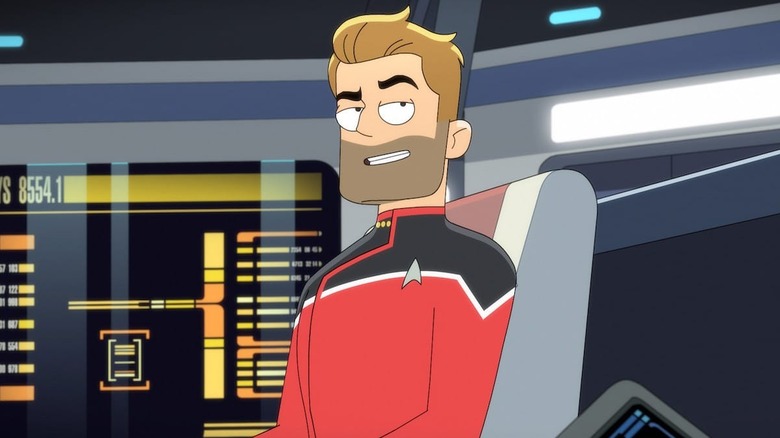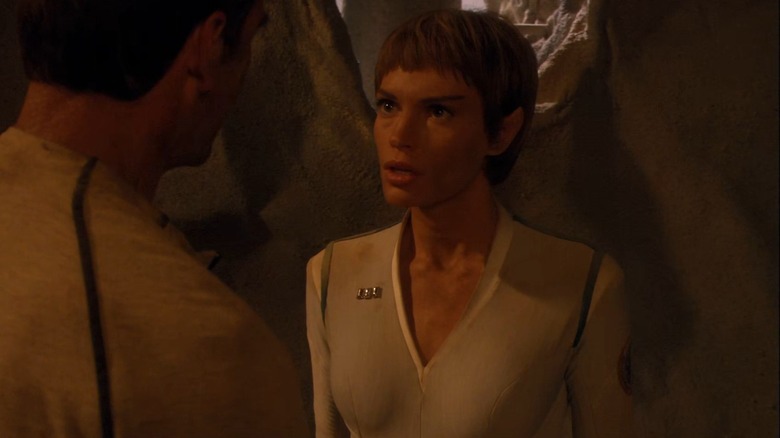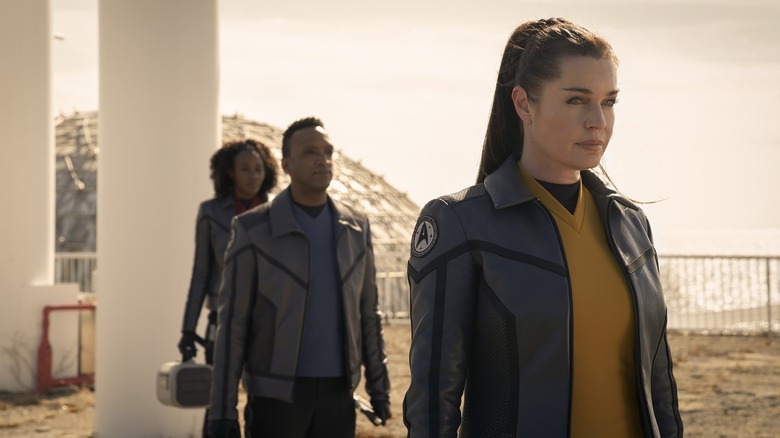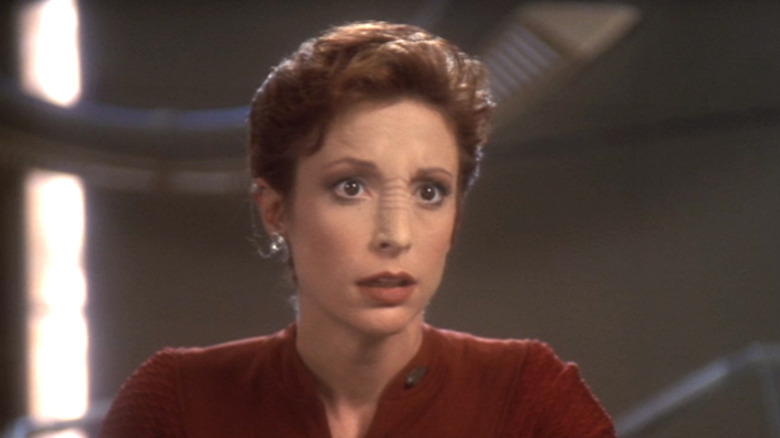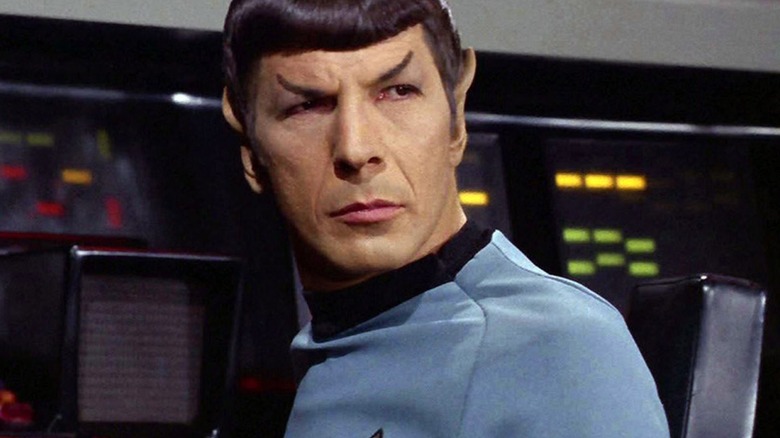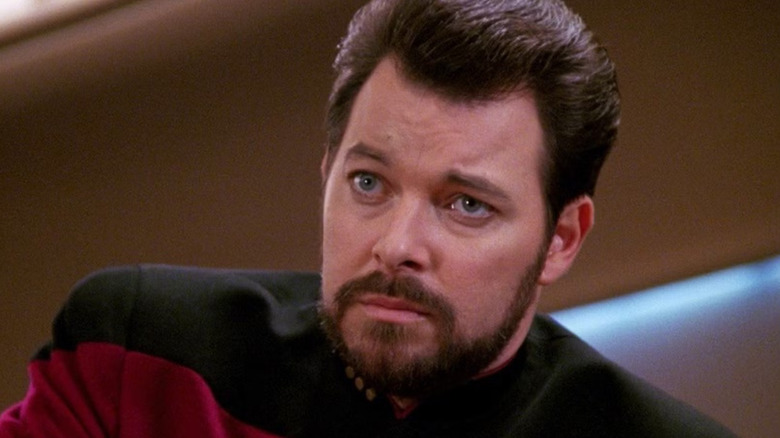Star Trek's First Officers, Ranked From Worst To Best
Everyone has their favorite "Star Trek" captain. Ever since the '90s, debates have raged as to whether Kirk could beat Picard, and once Sisko came along, all bets were off. Just as every Klingon warrior needs a cha'Dich, even the best captain needs a solid second behind them. Over the years, many have tried to follow in the footsteps of Starfleet greatness, sometimes even exceeding it. As great as the limelight is, however, the position of reliable backup can be even harder.
It's time for the first officers to shine. Who are the greatest seconds-in-command? Like asking what makes a great vice president, that can be tough. Do we want someone who can and will take over or just the very best at carrying out their orders?
For the purposes of equal ranking, we haven't included absolutely every main crew in the franchise — the musical chairs of the first few seasons of "Discovery" make it tough to consider those first officers who generally just used the position as a stepping stone, the kids of "Prodigy" took a while to become official in any way, and the crew initially hired by Picard in "Picard" don't really have formal ranks. This is a ranking of the best "Star Trek" first officers who made it for the duration, or in the case of one honorable mention, probably would have.
Honorable Mention: Willard Decker (Phase II/The Motion Picture)
Decker (Stephen Collins) would have been the first officer on the prematurely canceled "Star Trek: Phase II" TV series, largely due to Leonard Nimoy's reluctance to return. Instead, when the whole thing was scrapped and reconfigured as "Star Trek: The Motion Picture," he and his ex, the beautiful and bald Ilia, carried over to the big screen alongside the classic original crew. Nimoy did return for the movie, but Decker stayed commander under Kirk.
Making the best of a bad situation, having been replaced by Kirk last-minute in the face of a massive alien threat, Decker serves honorably. At one point, he even blatantly disobeys Kirk in order to stop him from accidentally blowing up the Enterprise. He also offers himself up as a final sacrifice, merging with the alien V'Ger that has already merged with Ilia, creating a brand new lifeform in the process. (Non-canonical novels have suggested this becomes the birth of the Borg.)
Unfortunately, actor Stephen Collins turned out to be considerably less heroic than his character, to put it mildly. After "Star Trek," and 10 seasons as a pastor on "7th Heaven," Collins confessed to inappropriate sexual contact with three teenage girls. He has since retired from acting.
Chakotay (Voyager)
A Native American former Starfleet officer-turned-terrorist is forced to make nice with his former allies at the far end of the universe, so both can survive. In theory, that should make for an interesting character, but instead, we got Chakotay, the sensitive, stoic stereotype of "Star Trek: Voyager."
Instead of being resentful at having to become a moderate in a uniform rather than a radical separatist, Chakotay pretty immediately fell in line, understanding his colleagues' hurt feelings and patiently counseling them to be good. Meanwhile, in his designated role as a "Space Indian," he would go on vision quests, assign crew members their spirit animals, and begin every other sentence with, "My people believe..." In one of the "Star Trek" storylines that became unwatchable with age, his tribe even turned out to be a fictional one whose distinctive tattoos were created by aliens. Nobody involved was Native either: Actor Robert Beltran was Mexican-American, and the show's consultant on Indian issues was "Jamake Highwater," a.k.a. Jackie Marks, a Jewish man with Eastern European ancestry who pretended to be Cherokee. Yikes.
Though the show occasionally teased more-than-friendship possibilities with Captain Janeway, Chakotay got awkwardly shoehorned into a romance with Seven of Nine towards the end of the series. It made so little sense that Beltran regrets it. Seven's return in "Picard," showing her in a same-sex relationship with Raffi (Michelle Hurd), seemed like a pretty definitive way to tell viewers that Chako-Nine, or whatever fans might call it, was dead and buried.
Jack Ransom (Lower Decks)
Objectively speaking, one could make a case that Ransom, from "Lower Decks," is the worst first officer. After all, the whole point of the show is that unlike every live-action "Trek," which tends to depict the best ship in Starfleet at the time, the U.S.S. Cerritos is decidedly not one of those. Ransom also frequently plays like a parody of James T. Kirk and Will Riker at their most spoof-worthy, getting shirtless at the drop of a tricorder and bragging about his adventures to anyone who'll listen.
It turns out that there's a method to his seeming macho madness, though. In the recent "Upper Decks" episode, he revealed that he only pretends to be a braggart and a doofus in order to unite and motivate his rebellious ensigns in proving themselves. When promoted to Captain in the series finale, he made it clear he would command similarly, pitting Boimler and Mariner against each other as rivals for the new First Officer spot. That's a tactic that works on reality TV, but isn't necessarily the most effective way to build crew cohesion.
Since we have a leader in real life who comes from reality TV and uses similar tactics, however, it is a timely allegory. That's not enough to get Ransom to the top of this list, but he still beats Chakotay.
T'Pol (Enterprise)
"Enterprise" came out at a time when a "Star Trek" show was not considered a guaranteed hit, so much so that it initially didn't even have "Star Trek" in its name. A prequel series that seemed to be ignoring canon — a pattern "Discovery" would follow years later — the show tried to rely on more conventional selling points, like sexuality. Characters would routinely strip to their underwear and rub decontamination gel on each other, and the female Vulcan character had to be, according to show co-creator Brannon Braga, "stunningly beautiful [who] could act," something he found very difficult to cast. Jeri Ryan's casting as Seven of Nine in a tight bodysuit was widely perceived to have saved "Voyager" from cancellation, so the template of "sext logician" was followed to a tee.
Actress Jolene Blalock was likely cast primarily for being a model, but she turned out to care very deeply about "Trek" lore, frequently arguing for the character's writing to be more consistent. Though the scripts didn't always serve her well, T'Pol still came away as a memorable character with more of an arc than most first officers. Beginning as an openly hostile observer, she slowly learned to first respect humans, and eventually even fell for one in engineer Trip Tucker. She ultimately left the Vulcan High Command to join Starfleet, setting the metaphorical table for the franchise's most famous character.
Una Chin-Riley (Strange New Worlds)
Contrary to the popular belief of casual viewers, Captain Picard didn't come up with the term "Number One" for his second in command — it was originally the moniker for Captain Christopher Pike's tough, logical first officer in the original "Star Trek" pilot, "The Cage," as played by Gene Roddenberry's future wife Majel Barrett. She wouldn't get the name Una until decades later in a 2016 non-canonical novel, and she only finally received a surname after appearing on "Star Trek: Discovery." (Sure, it may be one of the five worst character names on "Star Trek" ever, but at least it's a name.)
NBC executives in the 1960s weren't keen on a hard-edged female first officer, however, and the character, like everyone else in the pilot except Spock, was dropped. Instead, some of her traits were given to Spock, and Barrett would reappear on the original series as Nurse Chapel.
As embodied by Rebecca Romijn, Chin-Riley now has even more in common with Spock than we once knew — she's an Ilyrian, passing as a human, which is super-controversial, because her species genetically augments themselves for survival on other worlds. The Federation, traumatized by Khan, has something of a blanket ban on that. Nonetheless, when exposed, she fought the law, and the law didn't win. The original Number One continues to boldly go in the "Strange New Worlds" timeline, eating spicy food and paving the way for the also-augmented Dr. Julian Bashir in the century to come.
Kira Nerys (Deep Space Nine)
When assessing the angry Bajoran Major from "Deep Space Nine," it helps to come up with an analogous human situation for her background. Imagine being a Holocaust survivor who joined the Mossad, only to have to become subservient to the United Nations, working directly under a man who is a literal Messiah figure in your religion but does not himself believe it. Can you blame Kira Nerys (Nana Visitor) for being a little cranky sometimes? She also saw one boyfriend basically get lobotomized, and another turned out to be from a species that allies with her old space-Nazi foes to declare war on the Federation.
Most people in that position would have a nervous breakdown. Kira doesn't believe in such things. However, playing Kira Nerys changed Nana Visitor, helping her to accept her own flaws and self-examine, not to mention having a child with costar Alexander Siddig.
As a first officer not formally part of the Federation, Kira could often be hostile to Captain Sisko's approach and ideas, but she was always open about it and took on their differences head on, which was exactly the way he liked it... most of the time. As "the Emissary" of the alien Prophets, worshipped by the Bajorans and a large man with a very deep voice, Sisko could shout her down if it ever really became necessary. One could also argue that her flexible wartime ethics rubbed off on him, to his benefit.
Spock (Original Series)
If we were strictly ranking "Star Trek" characters overall, Spock would probably win. He caught on in pop culture almost immediately, yielding "I Grok Spock" bumper stickers, and allowing Leonard Nimoy to pursue a singing career that, let's face it, he never would have achieved on musical merit alone. He's been portrayed in live-action by two actors since Nimoy, both of whom managed to avoid embarrassing themselves and drew new fans to our favorite half-human Vulcan. So why isn't he at the top of this list?
Let us stipulate first that we are talking about Original Series Spock specifically, because the "Strange New Worlds" version of Spock isn't first officer yet. We also concede that he is an amazing first officer. He's brilliant, he's logical, and yet his human side recognizes that logic is merely the beginning of wisdom. He's fiercely loyal, good in a fight, and usually capable of realizing when he's been compromised.
Nonetheless, part of his effectiveness comes from him being part of a triangle with Kirk and McCoy. Together, they are id, ego, and superego, and give their ship (and the show) its strength. Without the right foils, Spock can go adrift. Also, on the rare occasions he does go rogue, his superior strength and nerve pinch make him an unacceptable threat. Heck, in the midst of being in Vulcan heat, he actually tried to kill Kirk in a ritual and thought he had succeeded. That alone should probably keep him from the very top spot.
William T. Riker (The Next Generation)
Eventually, "Star Trek" had to give him his own ship, but frankly, Will Riker is the perfect second-in-command. He's likable when he needs to be, bossy when it's called for, and he can straddle a chair like nobody else. Riker's not the guy to suddenly do angry, impulsive things — if you need proof of that, consider that he got back together with Deanna Troi even after she had a fling with Worf. He might have been reckless in another life, as we saw when his transporter clone, unburdened by the same sense of duty, joined the terrorist Maquis. On the whole, though, Riker is at his most comfortable carrying out orders and going on the away missions that Starfleet only just decided Captains should avoid. (Probably because of Kirk, if we're being honest.)
Years after "The Next Generation," as we see in "Picard," Riker has endured the tragic loss of a child, yet he's still the dependable best friend with a twinkle in his eye, even as we sense he probably hasn't called Picard in a while. When you can see an old colleague again and pick up exactly where you left off in both business and friendship, that's reliability and trust. And it's not because of cranky, reclusive, child-hating Picard that it happens, clearly. The old man still has issues, but Riker faced his, kept his marriage together, and never lost a step. "Number One," forever and always, is number one.
